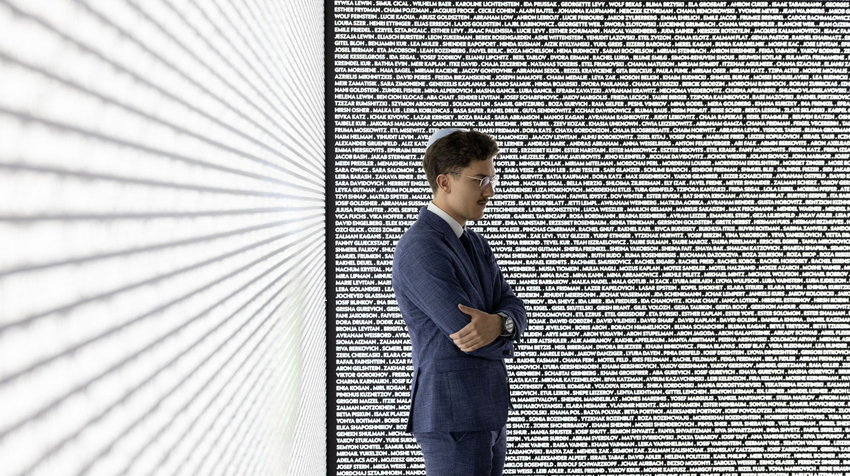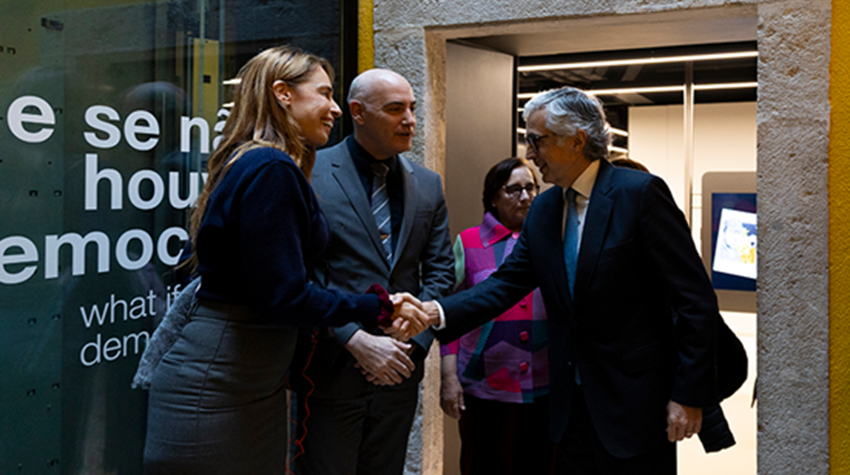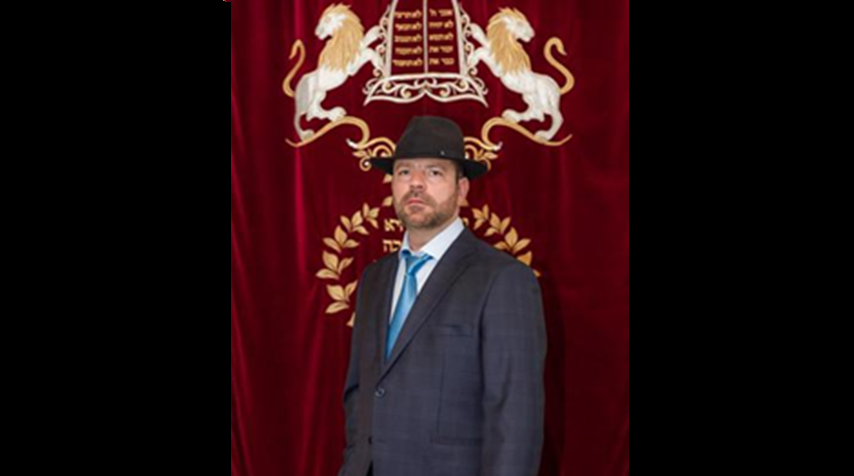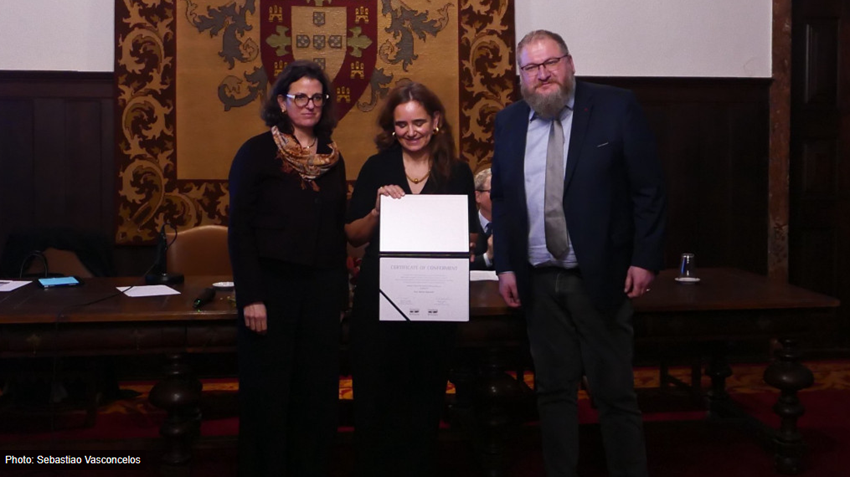The commitment to historical memory and human rights takes on new forms through the dedication of young people who choose paths of service and reflection. Noah Elias Jakovljević is the fourth Austrian volunteer from the Österreichischer Auslandsdienst (Austrian Service Abroad) program to carry out temporary work with the Jewish Community of Oporto.
In this interview, he shares his motivations, challenges, and lessons learned while representing Austria in a mission that transcends national borders, promoting dialogue and education as pillars for building a more conscious and compassionate society.
PJN - Can you tell us what the Österreichischer Auslandsdienst – Austrian Service Abroad is and what its main mission is?
NOAH - The Austrian Service Abroad is an association that sends volunteers all over the world to represent Austria in the fields of Holocaust remembrance, social service, and peace work. Its main mission is to promote remembrance and awareness of the Holocaust, support social initiatives, and foster global dialogue. Volunteers can choose between three types of service: Gedenkdienst (Holocaust Memorial Service), Social Service, and Peace Service.
PJN - What motivated you to join this program, and what was the selection process like?
NOAH - The main reason I joined was my desire to go abroad while still fulfilling Austria’s compulsory military or civil service. I’ve always had a deep interest in Holocaust-related work. I grew up just 10 minutes away from Austria’s largest former concentration camp, Mauthausen, and World War II history has always been present in my life. My great-grandfather, Mijo, fought the fascists in Croatia and was later imprisoned in a camp in Carinthia. He survived – otherwise, I wouldn’t be here.
The selection process is challenging. Each volunteer must complete at least 150 hours of preparation in their field – in my case, Gedenkdienst. This preparation includes historical studies, lectures, and regular meetings, often while finishing high school. It can be tough, especially when more than one candidate applies for the same host institution. In such cases, interviews are held, and the most suitable candidate is recommended – although all applicants are presented.
PJN - What kind of preparation or training did you receive before being sent to Portugal? Did you choose Portugal as your destination?
NOAH - I participated in numerous online conferences and discussions with ambassadors and experts, which helped shape my understanding of the work ahead. One key part of the training is the “Mittwochskonferenz,” which takes place every second Wednesday and is mandatory for all volunteers. Furthermore, there are compulsory meetings with Yad VaShem which should prepare us for our Gedenkdienst. We also had to meet in person and did several workshops in Mauthausen and other cities, e.g. Berchtesgaden, where Hitler’s residency was located.
Additionally, I had monthly meetings with others serving in Western Europe, including my predecessor Árpád Géza Wack, who supported me in preparing for Portugal. After careful consideration, I chose Portugal, although there was another applicant for the same position. I was fortunate to be selected, and from that point on, a new chapter in my life began.
PJN - You work at the Holocaust Museum of Oporto, the Synagogue Kadoorie Mekor Haim, and the Jewish Museum of Oporto. What is your daily routine like at the institutions?
NOAH - Working at the Synagogue, the Jewish Museum, and the Holocaust Museum is a unique and enriching experience, and there’s hardly a fixed daily routine. On some days, I start later because I also attend Portuguese classes at the University of Porto.
Most days, I spend time in the office discussing Jewish-related news and ongoing projects with my colleagues. In the Synagogue and Jewish Museum, I welcome many visitors, mostly tourists from the U.S., and enjoy engaging in conversations that help me understand the Jewish diaspora better.
The most meaningful part of my work is guiding students through the Holocaust Museum. I try to understand the younger generation and connect with them. After the tour, students often ask personal questions – not just about the history, but also about me and Austria.
At the end of the day, I often reflect with my colleagues on religious topics. Judaism is still quite new to me, and sometimes I feel like a tiny fish in a vast ocean – but a curious one.
PJN - The Holocaust Museum of Oporto receives school visits from children and teenagers from all over Portugal. In your view, what kind of impact do these visits have on the students?
NOAH - The impact is remarkable. It’s inspiring to see how students, who often arrive with little knowledge of the Holocaust, leave with a deeper understanding and emotional response. I witness genuine empathy. Many are shocked by how methodically the Nazis carried out their plans.
One of the most rewarding aspects is seeing how their perception of Jewish people changes. They realize how absurd and dangerous the ideology of a "master race" was. Seeing them gain awareness and compassion gives meaning to my work.
PJN - What has been the most memorable experience you’ve had during your time abroad?
NOAH - One moment stands out. During the winter, a Canadian couple visited all three institutions. After guiding them through the Holocaust Museum and sharing parts of my family history, the woman asked me, “Noah, thank you – but I have to ask, are you Jewish?”
I said no. There was a short silence. Then she began to cry. I worried I had said something wrong, but instead, she hugged me and said, “Thank you so much for remembering your country’s history and standing with us, the Jewish people – even though you are not Jewish yourself.”
That moment moved me deeply. I realized this service is more than education – it builds bridges of empathy and love. It reminded me that humanity is not defined by religion or ethnicity, but by compassion.
PJN - How has this experience shaped your perspective on identity, historical responsibility, and human rights?
NOAH - This experience has been life-changing. Living abroad and away from my parents for the first time made me reflect on identity – what it means to belong to a country or group.
Historical responsibility has always been a priority for me. I’ve learned that it requires dialogue, not blame. There’s a German school next to our Synagogue that barely visited before. I reached out and offered to guide them in German. Eventually, they came – and I learned they had been afraid of being judged. That taught me that healing historical wounds requires trust and initiative.
Finally, I realized that human rights are easier to write down than to live by. My work reminds me every day that I have the chance to be a small ambassador for dignity, justice, and remembrance.
In the end I want to take a chance to say "Todah Rabah" to the Jewish Community of Oporto, for cooperating with the Austrian Service Abroad and being a great institution. The community, even upon arrival, always made me feel welcome and shows me the greatest respect. I came as a volunteer but was received like a family member.



































